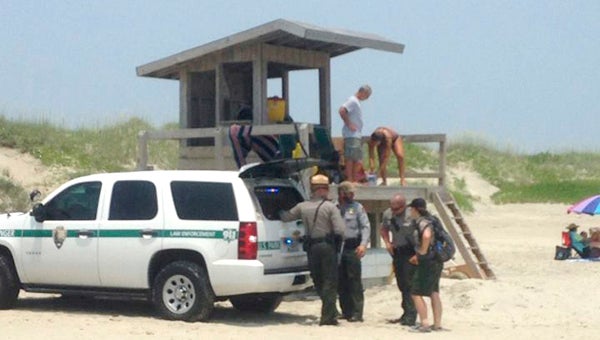Washingtonians witness Ocracoke shark attack
Published 8:55 pm Wednesday, July 1, 2015

GARLEEN WOOLARD
AFTERMATH: Though the shark attack victim already on the way to the hospital, park rangers with the National Park Service were still on scene at the lifeguard stand where the attack took place. It was the seventh shark attack in North Carolina waters since June 11.
A seventh shark attack in North Carolina waters took place Wednesday, this one at one of the lifeguard beaches on Ocracoke. Washington resident and former city employee Garleen Woolard and her family were on the beach with about 50 other beachgoers when the attack happened.
“We heard someone say, ‘Get the lifeguard.’ It was hard to tell at first what was happening,” Woolard said. “There were two gentlemen helping an older gentleman out of the water. … It appeared he had some lacerations. How bad they were, I’m not sure.”
The man was walking on his own, though leaning heavily on the other two men, Woolard said. According to an Associated Press article, the 68-year-old was bitten several times in waist-deep water, suffering wounds to his ribcage, lower leg, hip and both hands as he tried to fight off the shark.
“We were about 100 feet away from them and we just stayed out of the way,” Woolard said.
Woolard had high praise for the park rangers who responded to the attack.
“The response team was just unbelievable,” Woolard said. “They were there within a minute. And those two girls (lifeguards) did an excellent job.”
The man was later airlifted off of Ocracoke.
There have been seven documented shark attacks on the North Carolina coast so far this summer, an unprecedented amount — the most in one year in the 80 years the International Shark Attack File has been kept by the Florida Museum of Natural History.
The first attack happened only two weeks ago: a 13-year-old girl at Ocean Isle Beach and suffered minor cuts; on Oak Island on June 15, a 12-year-old lost part of her arm and a 16-year-old lost his arm in two separate attacks that took place 90 minutes apart; on June 24, an 8-year-old in Surf City had minor injuries to his lower leg; on June 26 in Avon, a man was bitten several times on the back; and on June 27, an 18-year-old suffered bites to his leg, buttocks and both hands while swimming at a Waves beach.
Shark researchers at East Carolina University attribute the increased number of attacks to an unseasonably hot June and the resultant warm temperature of the water — fish have migrated north earlier than usual, and with them, come their predators, the AP article said.
Woolard said Ocracoke officials suggested people stay out of the water in the immediate aftermath of the attack.





